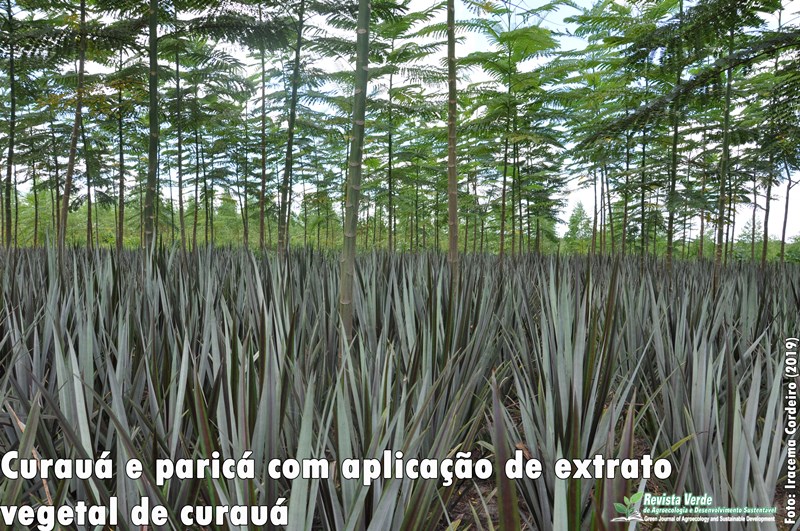Initial growth of curauá and paricá under the application of curauá’s vegetal extract
DOI:
https://doi.org/10.18378/rvads.v14i4.6515Keywords:
Biomass, Organic fertilizer, Waste managementAbstract
This study had the objective to test the effect of soil fertilization with curauá’s vegetal extract (Ananas erectifolius) over the growth of individuals of curauá and paricá (Schizolobium parahyba var. amazonicum) planted in consortium. The work was carried out in the experimental field of the company Tramontina Belém, municipality of Aurora do Pará, PA, Brazil. The experiment followed a fully randomized experimental design, with five treatments and four repetitions per treatment, totaling 20 experimental plots. The adopted planting spacing was 4 x 3 m among individuals of paricá and 0.80 m x 0.80 m among plants of curauá. The five treatments consisted in different concentrations of curauá’s vegetal extract: 100% extract; 75% extract and 25% water; (3) 50% extract and 50% water; (4) 25% extract and 75% water and (5) a control with 100% water. The curauá’s vegetal extract was applied in a monthly basis during six months and the assessed variables were: number and length of curauá’s leaves and height and diameter of paricá. From the results obtained, it is possible to observe that there was a positive effect of soil fertilization when the curauá’s vegetal extract was used in the concentration of 25% over the number and length of curauá’s leaves, as well as it is possible to infer that positive results occurred in the concentration of 75% over growth in height and diameter of paricá. The curauá’s vegetal extract can be used as organic fertilizer in consortium plantings, however studies in more detail are necessary to permit indications of more efficient concentrations for the growth of individuals of curauá and paricá.
Downloads
References
ANDRADE, V. M. S. de; CORDEIRO, I. M. C. C.; SCHWARTZ, G.; RANGEL-VASCONCELOS, L. G. T.; OLIVEIRA, F. de A. Considerações sobre o clima e aspectos edafoclimáticos da mesorregião nordeste paraense. In: CORDEIRO, I. M. C. C.; RANGEL-VASCONCELOS, L. G. T.; SCHWARTZ, G.; OLIVEIRA, F. de A. (eds.) Nordeste Paraense: Panorama Geral e Uso Sustentável das Florestas Secundárias. Belém: EDUFRA, 2017. p.59-86.
CIAT (CENTRO INTERNACIONAL DE AGRICULTURA TROPICAL). Restoring Amazonia: promoting Eco-Efficient land use alternatives = Restauración de la Amazonia: fomento de alternativas Eco-Eficientes para uso del suelo. Turrialba, 2016.
CORDEIRO, I. M. C. C.; SANTANA, A. C.; LAMEIRA, O. A.; SILVA, I. M. Análise econômica dos sistemas de cultivo com Schizolobium parahyba var. amazonicum (Huber ex Ducke) Barneby (Paricá) e Ananas comosus var. erectifolius (L. B. Smith) Coppus & Leal (Curauá) no município de Aurora do Pará (Pa), Brasil. Revista da Faculdade de Agronomia, v. 26, n.2, p. 243-265, 2009.
CORDEIRO, I. M. C. C.; OLIVEIRA JR. M. C.; GAZEL FILHO A. B.; BARROS, P. L. C. de; LAMEIRA, O. A.; OLIVEIRA F. DE A. Crecimiento del Schizolobium parahyba var. amazonicum cultivado en presencia de Ananas comosus var. erectifolius en Pará, Brasil. Agrociencia v.50, n.1, p.79-88, 2016
CORDEIRO I. M. C. C.; BARROS, P. L.C. de; LAMEIRA O.A.; GAZEL FILHO, A. B. Avaliação de plantios de paricá (Schizolobium parahyba var. amazonicum (huber ex Ducke) Barneby de diferentes idades e sistemas de cultivo no município de Aurora do Pará - Pa (Brasil). Ciência Florestal, v. 25, n.3. p.679-687, 2015. 10.5902/1980509819618
CORDEIRO, I. M. C. C.; LAMEIRA O. A.; BARROS P. L. C. DE; MALHEIROS, M. A. da M. Comportamento do curauá sob diferentes níveis de radiação fotossinteticamente ativa em condições de cultivo. Revista Brasileira de Ciências Agrárias, v.5, n.1, p.49-53, 2010. 10.5039/agraria.v5i1a609
DUCKE, A. As Leguminosas da Amazônia Brasileira. Serviço florestal, Ministério da Agricultura, Serviço de Publicidade Agrícola. Rio de Janeiro, 1939. 88p.
EMBRAPA (CENTRO NACIONAL DE PESQUISA DE SOLOS). Sistema Brasileiro de Classificação de Solos. Embrapa Solos, Embrapa Produção de Informação, Rio de Janeiro, 412p, 1999.
FERNANDES, M. F.; BARRETO, A. C.; FILHO, J. E. Densidade de semeadura a lanço de sete leguminosas utilizadas como adubo verde em solos de tabuleiros costeiros. Embrapa-CPATC (Comunicado técnico), Aracaju, 1998.
JOSE, S. Agroforestry for ecosystem services and environmental benefits: An overview. Agroforestry Systems, v.76, n.1, p.1-10, 2009. 10.1007/s10457-009-9229-7
LEDO, I. A. DE M. O cultivo do curauá no lago grande de Franca. Belém: Banco da Amazônia S/A, 1967. 23 p.
MONTEIRO, K. F. G.; KERN, D. C.; RUIVO, M. DE L. P.; RODRIGUES, T. E; COMETTI, J. L. S. Uso de resíduos de madeira como alternativa de melhorar as condições ambientais em sistema de reflorestamento. Acta Amazonica, v.40, n.3, p. 409-414, 2010. 10.1590/S0044-59672010000300001
PRABHU, M.; KUMAR, A.; RAJAMANI, K. Influence of different organic substances on growth and herb yield of sacred basil (Ocimum sanctum L.). Indian Journal of Agricultural Research, v.44, n.1, p.48-52, 2010.
RAVEN, P. H.; EVERT, R. F.; EICHHORN, S. E. Biologia vegetal. Rio de Janeiro: Guanabara Koogan, 2001. 906p.
RUIVO, M. DE L. P.; MONTEIRO, K. F. G.; SILVA R. M. DA; SILVEIRA, I. M. DA, QUARESMA, H. D. DE A. B.; SÁ, L. D. A.; PROST, M. T. R. DA C. Gestão florestal e implicações sócio-ambientais na Amazônia Oriental. Oecologia Brasiliensis, v.11, n.4, p.481-492, 2007. 10.4257/oeco.2007.1104.02
SCHWARTZ, G.; PEREIRA, P. C. G.; SIVIERO, M. A.; PEREIRA, J. F.; RUSCHEL, A. R.; YARED, J. A. G. Enrichment planting in logging gaps with Schizolobium parahyba var. amazonicum (Huber ex Ducke) Barneby: A financially profitable alternative for degraded tropical forests in the Amazon. Forest Ecology and Management, v.390, p. 166–172, 2017. 10.1016/j.foreco.2017.01.031
TEREZO, R. F; SZÜCS, C. A. Análise de desempenho de vigas em madeira laminada colada de paricá (Schizolobium amazonicum Huber ex. Ducke). Scientia Forestalis, v.38, n.87, p.471-480, 2010.
TRINDADE, E. F. DA S.; RODRIGUES, T. E.; CARVALHO, E. J. M.; CORRÊA, P. C. S. Matéria orgânica e atributos físicos de argilosso amarelo distrófico no Nordeste paraense. Amazônia: Ciência e Desenvolvimento, v.5, n.9, p.187-198, 2009.
VIEIRA, L. S.; SANTOS, P. C. T. C. dos. Amazônia: seus solos e outros recursos naturais. São Paulo: Ceres (Agricultural Research Communication Centre), 1987.













